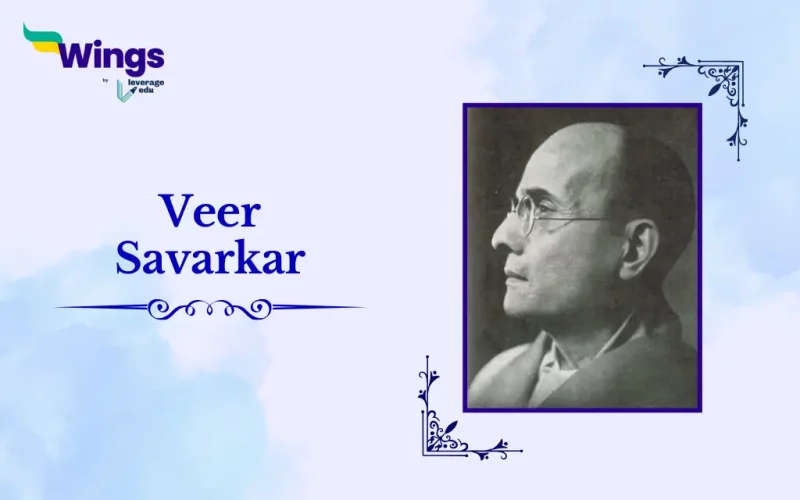Veer Savarkar Biography: An influential figure in Indian history, Veer Savarkar is almost synonymous with the concept of Hindutva. Born in 1883, his political activism began early, leading to the formation of the secret society, Abhinav Bharat. While studying law in England, he actively promoted Indian independence and authored controversial works like “The Indian War of Independence.” Furthermore, his revolutionary activities led to a life sentence in the infamous Cellular Jail.
Table of Contents [show]
Overview of Veer Savarkar
Additionally, here is an overview of information about Vinayak Damodar Savarkar.
| About Veer Savarkar | |
| Full Name | Vinayak Damodar Savarkar |
| Pronunciation | Marathi pronunciation: [ʋinaːjək saːʋəɾkəɾ] |
| Birth Date | 28th May 1883 |
| Death Date | 26th February 1966 |
| Nationality | Indian |
| Occupations | Politician, Activist, Writer |
| Honorific Prefix | “Veer” (meaning ‘brave’) |
| Education | High School; Fergusson College in Pune |
| Notable Activities | Founded the Abhinav Bharat Society with his brother |
| Involved with India House and Free India Society in the United Kingdom | |
Veer Savarkar Biography
When he was released from jail for his revolutionary activities, Savarkar emerged as a charismatic leader, popularising the term “Hindutva” to define a collective Hindu identity.
- As the president of the Hindu Mahasabha, he advocated for a Hindu Rashtra and the militarisation of Hindus.
- In addition, his stance against the British and his differences with Mahatma Gandhi are well-documented.
- In the aftermath of India’s independence, he was trapped in the Mahatma Gandhi assassination case but was acquitted due to lack of evidence.
- Savarkar’s legacy remains a subject of intense debate even with his contributions to the freedom struggle. However, his views on Hindu nationalism continue to be a point of contention.
- The rise of the Bharatiya Janata Party has brought his ideology into the mainstream, hence making him a polarising figure in contemporary Indian politics.
Early Life and Activism
Vinayak Damodar Savarkar, born in 1883, displayed early signs of activism. As a student, he led attacks on mosques and founded the Abhinav Bharat Society, an underground revolutionary organisation.
- His studies at Fergusson College under the influence of Lokmanya Tilak further ignited his political fervour.
- In London, he immersed himself in revolutionary activities, publishing books advocating Indian independence and establishing connections with organizations like India House and the Free India Society.
- However, his revolutionary pursuits led to his arrest in 1910, and he was sentenced to life imprisonment in the Cellular Jail.
Also Read: Who was Shamsher Bahadur Singh?
Imprisonment and Release of Veer Savarkar
Savarkar’s escape attempt from a ship bound for India and subsequent return to British custody became a controversial incident.
- His trial and conviction for waging war against the British resulted in a 50-year prison sentence.
- Savarkar spent years in the harsh conditions of the Cellular Jail, where he wrote his influential work “Essentials of Hindutva.”
- After numerous clemency petitions, Savarkar was finally released in 1921 but remained under restricted movement in Ratnagiri.
- During this period, he continued his intellectual pursuits and met influential figures like Mahatma Gandhi and B.R. Ambedkar.
Leadership of Hindu Mahasabha and Later Years
Upon unconditional release in 1937, Savarkar carried forward the leadership of the Hindu Mahasabha.
- He advocated for Hindu unity and militarisation, opposing the Quit India Movement and forming alliances with the Muslim League in certain provinces.
- Savarkar’s stance on these issues, along with his involvement in the Hindu Mahasabha, became a subject of controversy.
- After India’s independence, Savarkar was arrested in connection with Mahatma Gandhi’s assassination but was later released due to lack of evidence.
- The Kapur Commission’s subsequent investigation raised questions about Savarkar’s potential involvement in the conspiracy, but no concrete evidence was found to establish his guilt.
Also Read: Shaheed Sukhdev: Life, Death, and Freedom Struggle
Death of Veer Savarkar
Furthermore, here is the information about Vinayak Damodar Savarkar’s death:
| Death of Veer Savarkar | |
| Date of Death | February 26, 1966 |
| Time of Death | Pronounced dead at 11:10 a.m. (IST) |
| Beginning of Atmaarpan | Savarkar began abstaining from drugs, food, and water on the 1st of February 1966 |
| Concept of Atmaarpan | Fast until death; explained in his article “Atmahatya Nahi Atmaarpan” |
| Condition Before Death | Highly serious, trouble breathing |
| Cremation Location | Electric crematorium in Sonapur locality, Bombay |
FAQs
Veer Savarkar graduated from Pune’s Fergusson College and secured a scholarship through Shyamji Krishna Varma to study law at Gray’s Inn in England, finding refuge at India House.
Yes! Savarkar’s wife passed away in 1963, and he subsequently initiated a fast unto death in 1966.
The title “Veer” was given to Savarkar by his followers as a mark of respect for his bravery and contributions to the nation.
Related Blogs
We hope you liked the Veer Savarkar Biography. If you want to know more about other Famous Personalities then visit our General Knowledge page!
 One app for all your study abroad needs
One app for all your study abroad needs















 45,000+ students trusted us with their dreams. Take the first step today!
45,000+ students trusted us with their dreams. Take the first step today!
